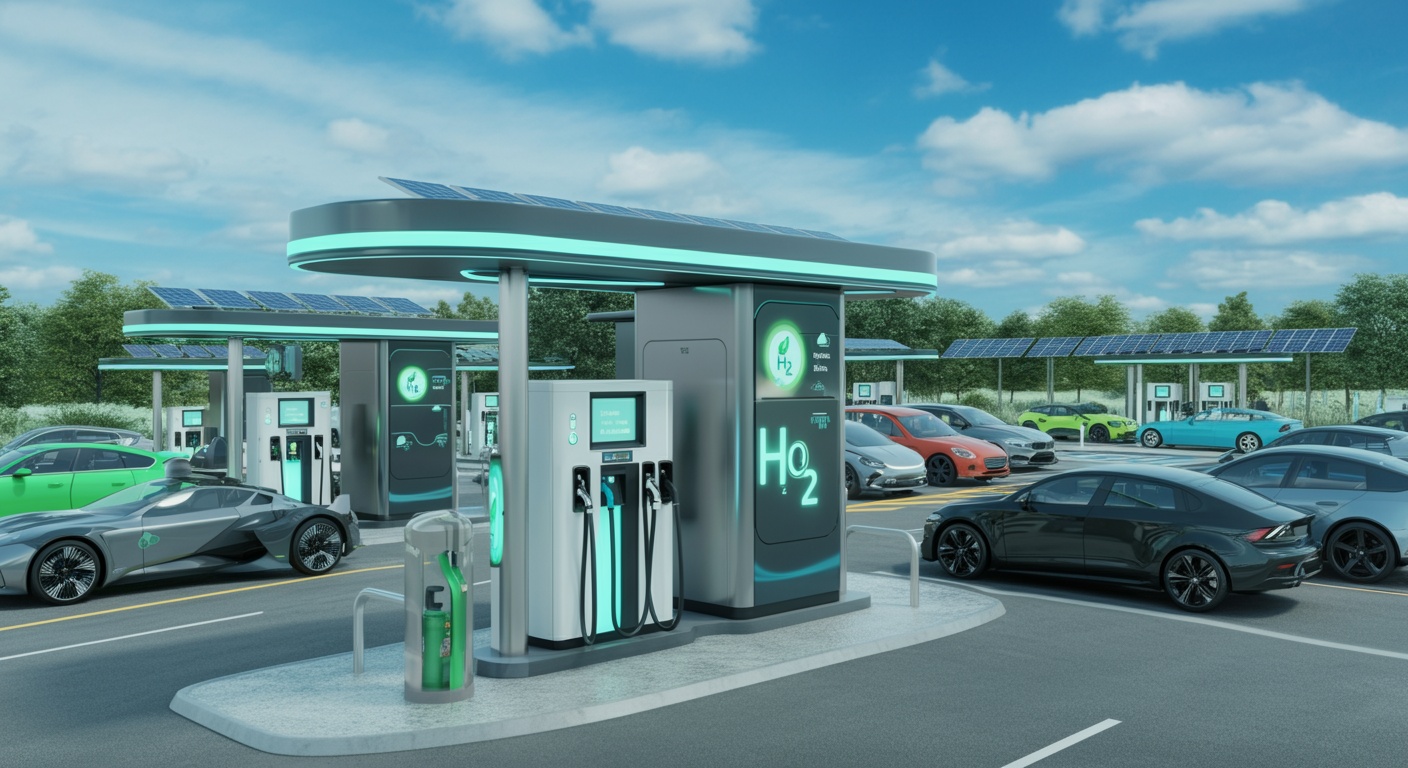The US is investing $635 million to enhance public electric vehicle (EV) charging and hydrogen fueling infrastructure
Innovations and Initiatives Infrastructure and CommunicationPosted by NewAdmin on 2025-01-16 13:08:45 |
Share: Facebook | Twitter | Whatsapp | Linkedin Visits: 39

The U.S. Department of Transportation's Federal Highway Administration (FHWA) has announced a significant $635 million investment to accelerate the expansion of public electric vehicle (EV) charging and hydrogen fueling infrastructure across the country. Funded by the Bipartisan Infrastructure Law, this initiative aims to build a comprehensive zero-emission transportation network, promoting environmental sustainability, job creation, and equitable access to clean energy technologies.
Jeff Marootian, Principal Deputy Assistant Secretary for the Office of Energy Efficiency and Renewable Energy, emphasized the importance of this investment. He stated, “This funding underscores the alignment of government efforts to maximize federal investments, building on the Department of Energy’s initiatives to develop a 21st-century energy workforce and prepare the grid to support nationwide zero-emission fueling infrastructure. The new charging and refueling stations will provide more accessible transportation options, create good-paying jobs, and foster innovation in communities nationwide.”
Driving Toward Zero Emissions: EV Charging and Hydrogen Fueling
This unprecedented funding will support 49 projects across 27 states, four federally recognized tribes, and the District of Columbia. It includes the installation of over 11,500 new public EV charging ports and a network of hydrogen and natural gas fueling stations. These efforts align with the U.S. goal to install 500,000 public EV chargers by 2030, a target that is on track to be met ahead of schedule.
Currently, the U.S. has over 206,000 publicly accessible EV chargers, with 38,000 added in 2024 alone. This growth is attributed to federal funding, tax incentives, state contributions, and private-sector investments. Since 2021, the number of accessible chargers has more than doubled, demonstrating a strong commitment to clean energy.
Federal Funding Powering Local Communities
The $635 million is divided between two main programs: the Charging and Fueling Infrastructure (CFI) Discretionary Grant Program and the National Electric Vehicle Infrastructure (NEVI) Formula Program. This round allocates $368 million for 42 community-focused projects and $268 million for seven corridor fast-charging initiatives.
A significant portion, 67%, of the funds will be directed to disadvantaged communities under the Justice40 Initiative, promoting equity. These investments will not only provide environmental benefits but also reduce transportation costs and healthcare expenses in regions most affected by air pollution.
Gloria Shepherd, Acting Federal Highway Deputy Administrator, remarked, “FHWA is committed to expanding the nation’s EV charging network to ensure all Americans can easily and reliably fuel their vehicles, regardless of location. The grants announced today will further this effort by investing in alternative fueling infrastructure, creating economic opportunities, and advancing equity in EV charging to benefit all Americans.”
Community Success Stories
- Cherokee Nation, Oklahoma: A $10.7 million grant will fund 112 public EV charging ports at 12 strategic locations, including parks and health centers. This initiative will ensure nearly all reservation residents are within 25 miles of a charger, aligning with the Cherokee Nation’s clean energy goals.
- Troy, Alabama: With $724,912 in funding, Troy will install 10 new EV charging stations across key sites, including a hospital, university, and sports complex, bolstering the local charging network and supporting economic growth by attracting more drivers to US Highway 231.
Corridor Expansion Highlights
- Port of Houston, Texas: A $24.8 million grant will establish a hydrogen fueling station for heavy-duty trucks at Bayport, contributing to national efforts to decarbonize transportation and promote clean hydrogen use.
- Mid-Atlantic Corridor Initiative: Maryland, Pennsylvania, New Jersey, and West Virginia will receive $18.6 million to install six fast public EV charging stations along the I-81 and I-78 corridors, supporting local fleet operations and connecting freight routes with alternative fueling infrastructure.
Enhancing U.S. Clean Transportation Infrastructure
The FHWA’s investments in public EV charging and hydrogen fueling infrastructure are paving the way for a sustainable transportation system. By focusing on disadvantaged communities, these initiatives address equity concerns, create good-paying jobs, and stimulate local economies. The development of hydrogen fueling infrastructure also supports efforts to decarbonize freight transportation, reducing emissions from medium- and heavy-duty vehicles and improving air quality in communities impacted by diesel pollution.
As the U.S. continues to lead in expanding public EV charging and hydrogen fueling infrastructure, these investments are not only steps toward achieving climate goals—they represent a significant leap toward a cleaner, healthier, and more equitable future for all.
Search
Categories
Recent News
- Hyderabad's Drug Bust: Uncovering a Sophisticated Network
- Hyderabad Rings in the New Year with Strict Rules
- Messi's India Tour: Hyderabad Gears Up After Kolkata Chaos
- Hyderabad Cracks Down on Drunk Driving: 407 Arrested in Weekend Blitz
- Hyderabad's Cyber Cops Foil Fraudsters: Quick Action Recovers Over Rs. 6 Lakh
- Hyderabad's Winter Fog: A Dangerous Drive
- Hyderabad's Drug Bust: Uncovering a Sophisticated Interstate Network
- Hyderabad Police Chief Warns Trans Community: No Forced Collections
Popular News
- Navigating IPO Market Dynamics Amid Volatility and Regulatory Changes
- Innovative Green Practices and Environmental Initiative
- Massive Worldwide Microsoft Outage Disrupts Multiple Sectors
- తెలుగుదేశం పార్టీ - పేదరికాన్ని నిర్మూలించడంలో వాగ్దానం
- Universities Embrace Remote Learning Technologies Amidst Ongoing Pandemic